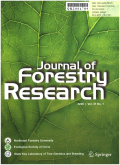- 钛学术文献服务平台 \
- 学术期刊 \
- 农业科学期刊 \
- 林业期刊 \
- 林业研究(英文版)期刊 \
Viability of recalcitrant Araucaria angustifolia seeds in storage and in a soil seed bank
Viability of recalcitrant Araucaria angustifolia seeds in storage and in a soil seed bank
基本信息来源于合作网站,原文需代理用户跳转至来源网站获取
摘要:
Araucaria angustifolia (Bertol.) Kuntze is a representative species of the Mixed Ombrophilous Forest in the Atlantic Forest Biome of Brazil.The development of a germplasm conservation protocol for long-term seed bank storage is compromised for this species,as it is sensitive to desiccation.Furthermore,in situ establishment of a soil seed bank in its natural habitat may be limited.This study evaluates the storability of two provenances of A.angustifolia seeds and their behavior in an artificial soil seed bank in two forest environments (understory and edge).Results show that both seed provenances may be stored at 5 ℃ for approximately 12 months,retaining high viability.The subsequent decrease in germination was associated with a reduction and an increase in seed water content,as well as with increased electrical conductivity.In the understory environment,seed viability was above 85% for the first 60 days,and at the end of the experiment (270 days),seedlings emerged.However,at the forest edge,there was a total loss of seed viability after 120 days associated with a reduction in water content and high predation.It is concluded,therefore,that short-term storage of A.angustifolia seeds is possible in a cold room,which is fundamental to supply seed demand outside the production period.Forest cover conservation is important for regeneration and conservation of the species.

推荐文章
Estimation of soil organic carbon storage and its fractions in a small karst watershed
Bare rock rate
Estimation method
soil organic carbon storage
Small watershed
Karst
The partitioning patterns of nutrients between pods and seeds of Zanthoxylum fruits impacted by envi
Partitioning pattern
Nutritional quality
C:N ratio
Zanthoxylum fruits
Mean annual temperature
Mean annual precipitation
Forest carbon storage in Guizhou Province based on field measurement dataset
Forest carbon storage
Field measurement dataset
Karst landform
Hyperspectral estimation model of soil Pb content and its applicability in different soil types
Hyperspectral data
Heavy metal
Pb
Estimation
内容分析
关键词云
关键词热度
相关文献总数
(/次)
(/年)
引文网络
引文网络
二级参考文献 (0)
共引文献 (0)
参考文献 (25)
节点文献
引证文献 (0)
同被引文献 (0)
二级引证文献 (0)
1979(1)
- 参考文献(1)
- 二级参考文献(0)
1982(1)
- 参考文献(1)
- 二级参考文献(0)
1984(1)
- 参考文献(1)
- 二级参考文献(0)
1993(1)
- 参考文献(1)
- 二级参考文献(0)
1997(1)
- 参考文献(1)
- 二级参考文献(0)
1998(1)
- 参考文献(1)
- 二级参考文献(0)
1999(1)
- 参考文献(1)
- 二级参考文献(0)
2000(3)
- 参考文献(3)
- 二级参考文献(0)
2001(1)
- 参考文献(1)
- 二级参考文献(0)
2002(1)
- 参考文献(1)
- 二级参考文献(0)
2003(1)
- 参考文献(1)
- 二级参考文献(0)
2006(1)
- 参考文献(1)
- 二级参考文献(0)
2008(1)
- 参考文献(1)
- 二级参考文献(0)
2009(2)
- 参考文献(2)
- 二级参考文献(0)
2010(2)
- 参考文献(2)
- 二级参考文献(0)
2013(1)
- 参考文献(1)
- 二级参考文献(0)
2015(4)
- 参考文献(4)
- 二级参考文献(0)
2016(1)
- 参考文献(1)
- 二级参考文献(0)
2020(0)
- 参考文献(0)
- 二级参考文献(0)
- 引证文献(0)
- 二级引证文献(0)
引文网络交叉学科
相关学者/机构
期刊影响力
林业研究(英文版)
主办单位:
东北林业大学
中国生态学学会
出版周期:
双月刊
ISSN:
1007-662X
CN:
23-1409/S
开本:
大16开
出版地:
哈尔滨市动力区和兴路26号(林大123信箱)
邮发代号:
创刊时间:
1990
语种:
eng
出版文献量(篇)
2459
总下载数(次)
1
总被引数(次)
7852
期刊文献
相关文献
推荐文献
- 期刊分类
- 期刊(年)
- 期刊(期)
- 期刊推荐
林业研究(英文版)2022
林业研究(英文版)2021
林业研究(英文版)2020
林业研究(英文版)2019
林业研究(英文版)2018
林业研究(英文版)2017
林业研究(英文版)2016
林业研究(英文版)2015
林业研究(英文版)2014
林业研究(英文版)2013
林业研究(英文版)2012
林业研究(英文版)2011
林业研究(英文版)2010
林业研究(英文版)2009
林业研究(英文版)2008
林业研究(英文版)2007
林业研究(英文版)2006
林业研究(英文版)2005
林业研究(英文版)2004
林业研究(英文版)2003
林业研究(英文版)2002
林业研究(英文版)2001
林业研究(英文版)2000
林业研究(英文版)1999
林业研究(英文版)2020年第6期
林业研究(英文版)2020年第5期
林业研究(英文版)2020年第4期
林业研究(英文版)2020年第3期
林业研究(英文版)2020年第2期
林业研究(英文版)2020年第1期

 免费查重
免费查重










